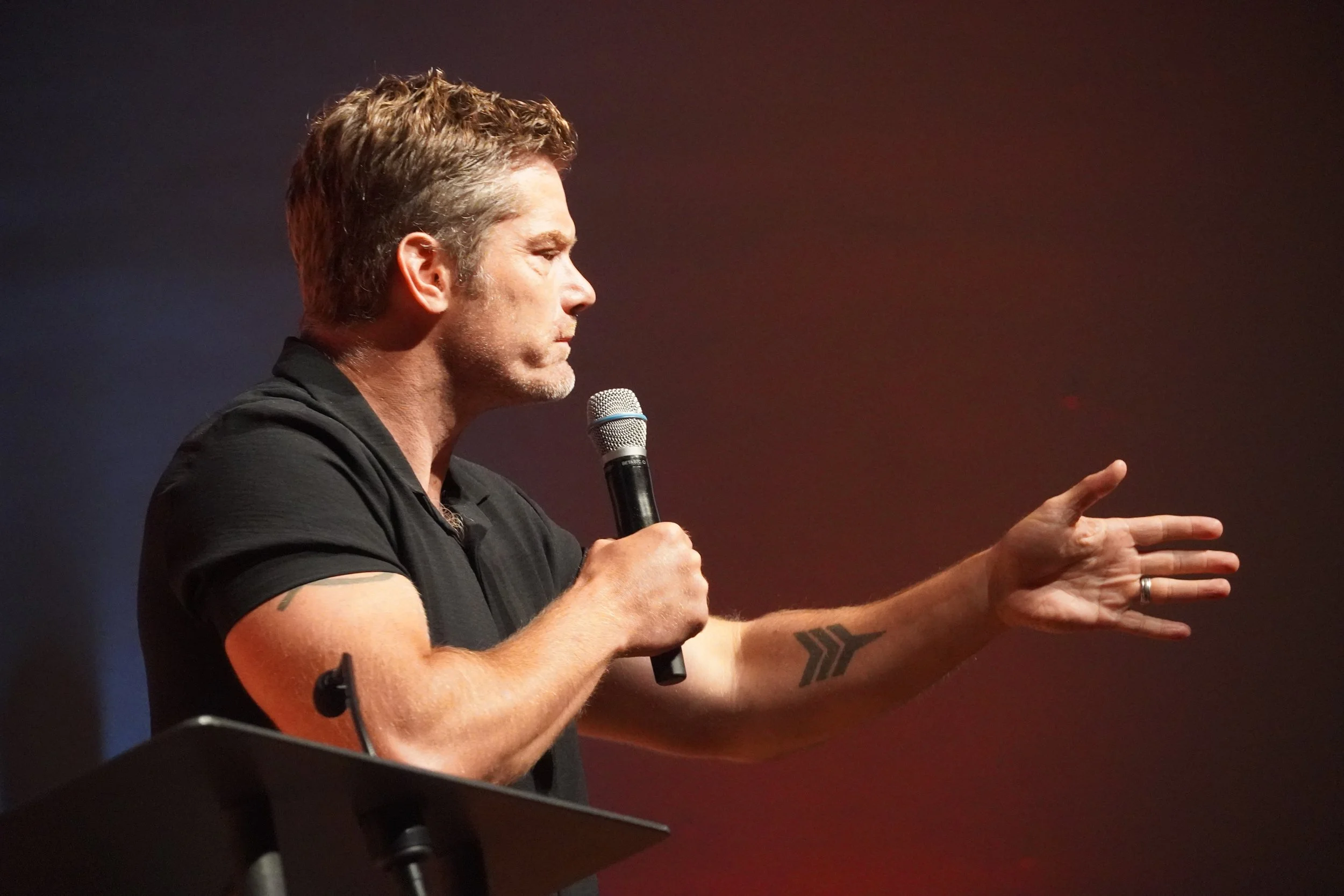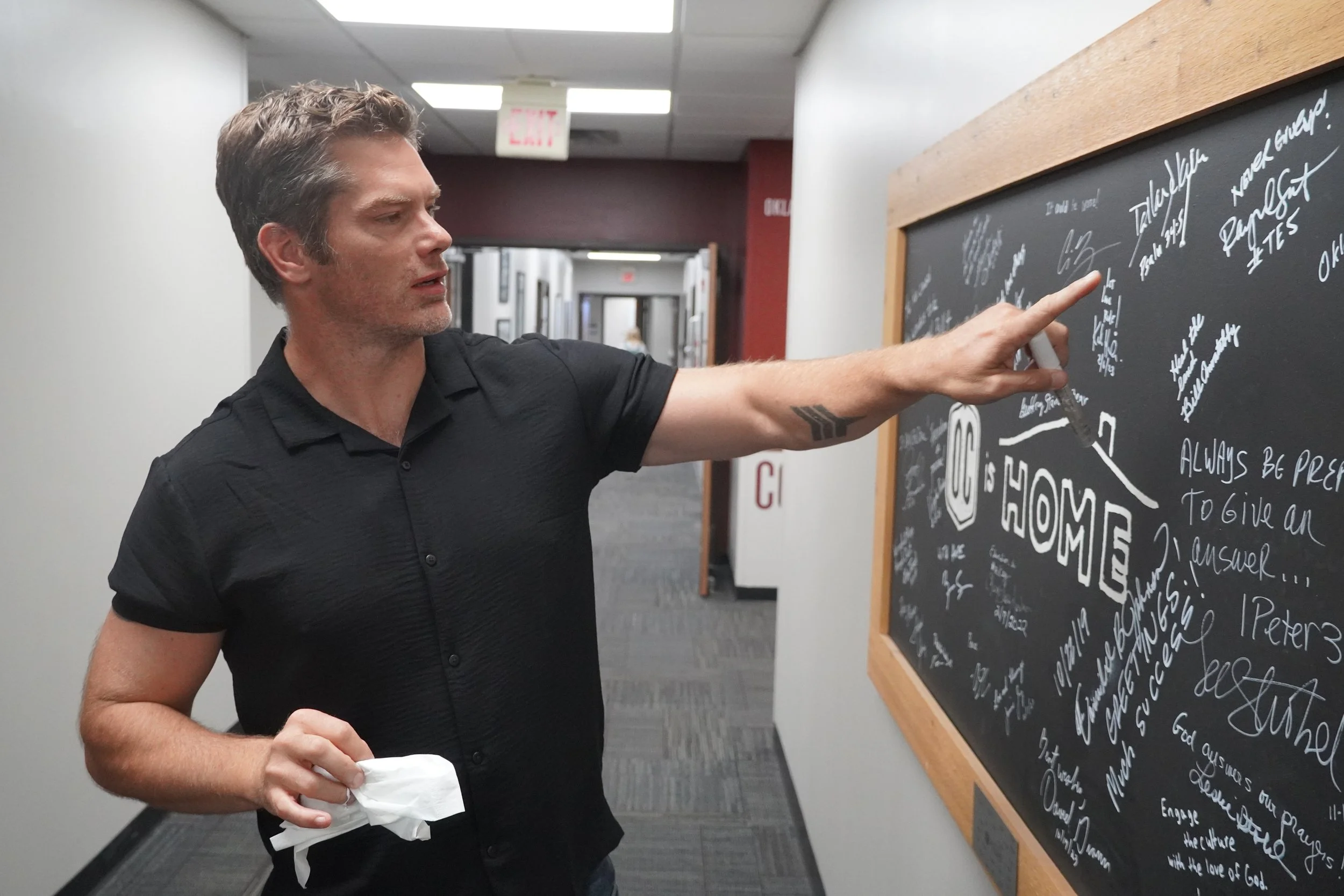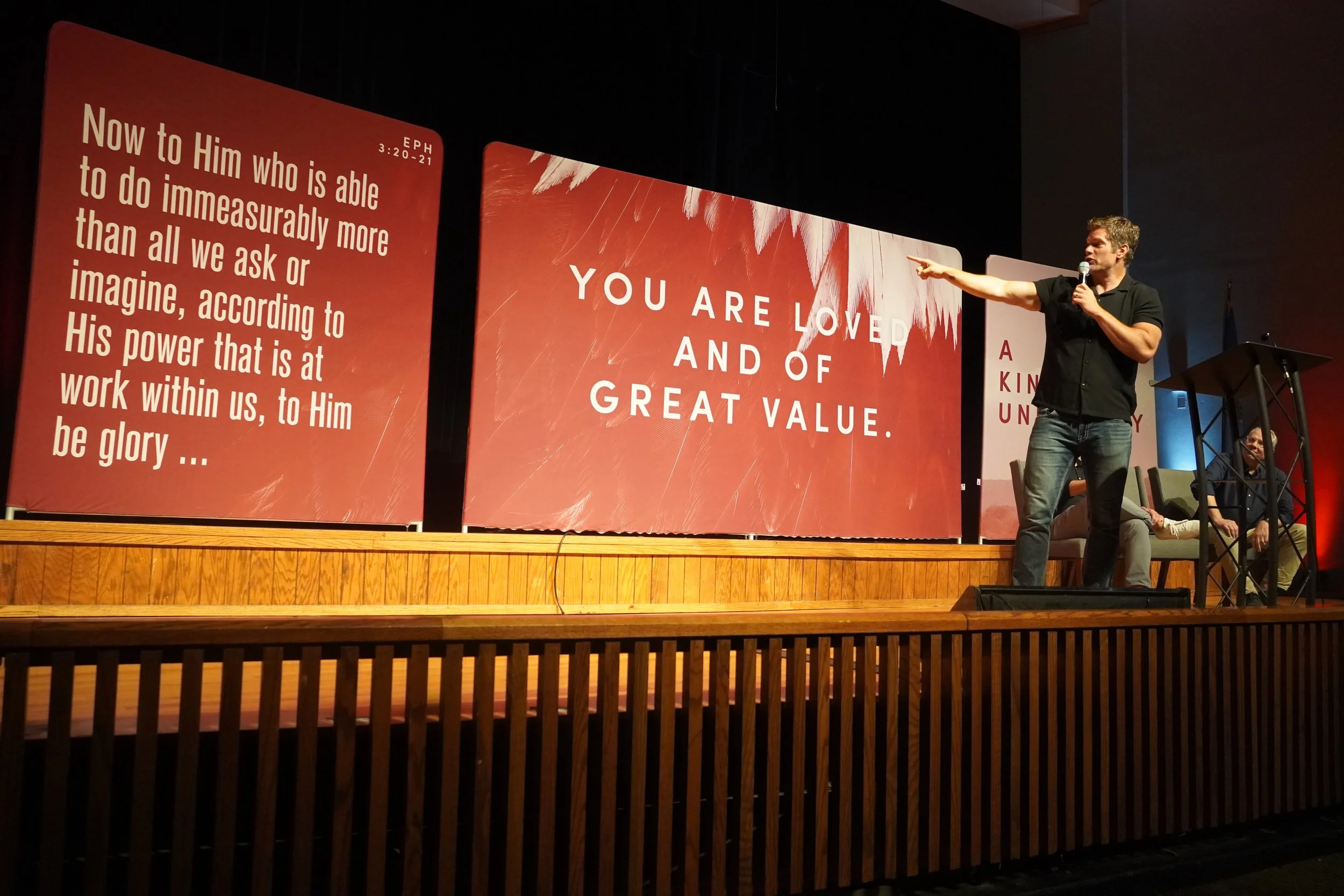🎬 ‘The Chosen’ Films The Crucifixion: How It’ll Be Different From Mel Gibson’s ‘Passion’ 🔌
Weekend Plug-in 🔌
Editor’s note: Every Friday, “Weekend Plug-in” meets readers at the intersection of faith and news. Click to join nearly 10,000 subscribers who get this column delivered straight to their inbox. Got feedback or ideas? Email Bobby Ross Jr.
OKLAHOMA CITY — More than two decades ago, I covered the opening of Mel Gibson’s “The Passion of the Christ” movie for The Associated Press.
I wrote that the people streaming out of a theater in Plano, Texas, north of Dallas, “looked as if they’d just attended a wake — and many said they felt as if they had.”
The brutal, bloody nature of Gibson’s 2004 portrayal of Jesus’ death on a cross drew both fans and critics — and mixed reviews.
In 2027, a new feature-length presentation of the Crucifixion will hit the big screen. It’ll mark the culmination of the much-anticipated Season 6 of the worldwide phenomenon “The Chosen.”
What should viewers expect?
Will it be similar to — or different from — “The Passion” version?
I welcomed the opportunity this week to ask such questions of Dallas Jenkins, the creator, executive producer and director of the hit religious drama, which premiered in the spring of 2019 as a crowdfunded project.
I talked to the evangelical filmmaker at Oklahoma Christian University, my alma mater, where he spoke Monday as part of the McBride Lecture for Faith and Literature.
“You, my friend, are lifting up the name of Jesus in such a powerful, powerful way,” Oklahoma Christian President Ken Jones said in welcoming Jenkins to campus.
Ariel Howarth, an 18-year-old freshman from Portland, Oregon, was among hundreds of fans of “The Chosen” who came to hear Jenkins.
“It’s a fun opportunity that we’re able to meet him and hear him speak,” the Oklahoma Christian student said.
“I really like how it brings all the characters to life,” she said of the first multiseason drama about the life of Jesus, “and it gives them personalities that I wouldn’t have thought about otherwise.”
Dallas Jenkins, creator of “The Chosen,” answers questions from Religion Unplugged’s Bobby Ross Jr. at Oklahoma Christian University. (Photo by Erik Tryggestad)
These highlights from my interview with Jenkins — son of Jerry B. Jenkins, co-author of the “Left Behind” books — have been lightly edited for clarity and brevity:
On why filming Season 6 was so difficult
“Season 6 was by far the hardest season we’ve ever filmed, one of the hardest things I’ve ever done. It included filming in Utah, Texas and Italy. We were in Italy for a month.
“I think Season 6 was meant to be hard. It was the longest season of filming, the hottest, the most physically challenging.
“Season 6 really captures around 24 hours of Jesus’ final hours — and I think God wanted us to get a little taste of some suffering and sacrifice for the purpose of capturing this. I think a lot of the strain and challenge and even at times desperation that we had while we were filming comes out on the screen.
“I think it was very visceral, and I think it’s going to turn out to be our best season as well. But it was definitely our hardest.”
On why Season 6 won’t debut until late next year
“The separation between the previous season is longer because it took longer filming, and our hope is to translate this into several dozen languages and release it all at once in those multiple languages. And that takes a long time.
“So a lot of times we’ve just released it in English and Spanish maybe, and then the rest of the languages catch up, and we really want to do it at the same time.
“The first six episodes will come out to streaming, and then the finale is a big, kind of supersized theatrical experience. So that’ll be released all over the world at the same time in early 2027.”
Dallas Jenkins talks to Jonathan Roumie, who stars as Jesus, on the set of “The Chosen.” (Photo provided by Dallas Jenkins)
On how “The Chosen’s” portrayal of the Crucifixion will compare with that of “The Passion of the Christ”
“There are two ways that I think we’re going to be different.
“Number one, we have more tools in our toolbelt than Mel Gibson did, by the fact that we have five seasons leading up to this. So he was using a lot of violence and visual intensity to try to capture the reality of the Crucifixion and the weight of the Crucifixion. But it was a movie, so he only had a limited amount of time.
“So we don’t need to do that to communicate just how visceral and intense a crucifixion was. Because for many people, just a simple reaction from one of Jesus’ closest friends is going to break us because we’ve known these characters for so long. So, it has more emotional weight because of the backstories that we’ve had for over five years.
“The second thing is, it’s not going to be quite as explicitly violent. Mel did it already. I don’t feel like I have anything new to add to the physicality of it. We’ve seen dozens of portrayals. Mel’s was the most violent. I think we’ve got an idea of what that looks like.
“I think for this storytelling that we’re doing, we’re trying to tell a story not just of the Crucifixion but of the history of humanity. This movie is going to cover and remind you of the history from the creation of the universe all the way to the Crucifixion — to help establish the need for the Crucifixion.
“So we’re coming at it, I think, from a little bit more of an emotional journey and a spiritual journey than a physical one.”
On why Jenkins — nonetheless — expects that journey to make a powerful impact
“As we were filming it, we couldn’t get through the days without taking turns having some sort of emotional breakdown. I had my first experience on set where I couldn’t get myself together emotionally.
“I can’t predict how everyone’s going to react. But for us — and for what I believe we’re capturing and the story that we’re telling and the truths of the Crucifixion — I think it’s going to be easily the most emotional impact our show has ever had.”
Dallas Jenkins, creator of “The Chosen,” speaks to students during a daily chapel assembly at Oklahoma Christian University. (Photo by Erik Tryggestad)
On filming the Crucifixion in the same general area as ‘The Passion of the Christ’
“So ‘The Passion’ was filmed in Matera, Italy, which is a city that has still preserved its thousands-of-years-old status. I mean, it’s the only place we could find where the horizon line still looked like the first century.
“And so several Crucifixion film projects have filmed there, going all the way back to ‘The Gospel According to St. Matthew,’ Pier Paolo Pasolini’s film in 1964. So there’s a reason why multiple film projects have filmed there.
“So I think our crosses were set up about 50 yards from where Mel’s were. And he’s actually filming ‘The Resurrection of the Christ’ movie (a sequel to ‘The Passion’) there as well, right?
“It’s a very, very special place, and it was clear to us that it was the only place that was right for this project.”
On learning of conservative activist Charlie Kirk’s assassination during the last week of filming Season 6
“I wasn’t close with Charlie. I knew him a little bit, and we had a lot of mutual friends.
“I think the difference between what Charlie was doing and what we’re doing is that Charlie kind of used politics as an on-ramp into discussions of Christianity. We’re kind of the other way around.
“I mean, we’re talking about the stories of Jesus. We don’t get into the political realm as a show, even though many people want us to, from both sides. The story of Jesus is oftentimes used for political purposes. One side likes to quote Jesus to support some of their political ends or policies that they’re wanting. Then the other side will use other quotes to support their policies.
“What we’re trying to do is just tell the stories of Jesus, and how people react to that is up to them — between them and God, them and their families, them and their church. We’re just trying to authentically portray the stories of Jesus as much as possible.
At the invitation of Scott LaMascus, founding director of Oklahoma Christian University’s McBride Center for Public Humanities, Dallas Jenkins signs a special chalkboard. It contains the names of prominent guest speakers who have visited Oklahoma Christian. (Photo by Erik Tryggestad)
“I used to be a little bit more politically active on social media. Since I’ve started doing ‘The Chosen,’ I’ve dramatically slowed that down. Because I feel like by telling the story of Jesus, I want to follow his example of, ‘Hey, look, I’m here about your heart.’
“And he was always speaking to very diverse groups of people. Sometimes he was divisive in his claims of salvation, and other times he was unifying. But the unification or the division was always on a spiritual level, not a political one.
“Now, of course, he would sometimes upset people because of politics. But I just found that my job is different from other people in the public sphere. So I’m just trying to tell the stories of Jesus as authentically as I can, and then the response is not up to me.”
On his excitement over speaking at Oklahoma Christian University
“I love college students. In many ways, ‘The Chosen’ was made for the college-age me. When I was in college, there wasn’t much in the way of media — other than like VeggieTales — that spoke to my experience and my faith.
“I was always frustrated by that, and it’s taken a long time for faith media to catch up. But I feel like now what I’m excited about is being able to speak to college students and also make ‘The Chosen,’ hopefully for them.
“Even at 50, I feel like I can serve some media that’s going to speak to their experience as much as possible. So I love coming to college campuses because I think this is the generation that we sometimes complain about because Gen Z is so different from us.
“But this is an opportunity to perhaps learn from each other.”
Dallas Jenkins emphasizes a Scripture displayed prominently on an auditorium stage at Oklahoma Christian University, where he spoke this week. (Photo by Erik Tryggestad)
Inside The Godbeat
Time flies.
When I left The Oklahoman, the daily newspaper in Oklahoma City, to join The Associated Press in 2002, my colleague Carla Hinton succeeded me as religion editor.
Hinton — now called the faith editor — has done an exceptional job in that role for 23 years.
I loved catching up with her and photographer Doug Hoke — who, Lord willing, will hit 50 years with The Oklahoman next year — at the Dallas Jenkins event.
Read Hinton’s story on Jenkins.
The Final Plug
Keeping with the theme, I really enjoy film critic Joseph Holmes’ excellent features and reviews for Religion Unplugged.
His stellar work includes coverage of faith-based movies and TV shows like, yes, “The Chosen.” And check out his latest piece on “House of David,” published this week.
Happy Friday, everyone! Enjoy the weekend.
Bobby Ross Jr. writes the Weekend Plug-in column for Religion Unplugged and serves as editor-in-chief of The Christian Chronicle. A former religion writer for The Associated Press and The Oklahoman, Ross has reported from all 50 states and 20 nations. He has covered religion since 1999.






